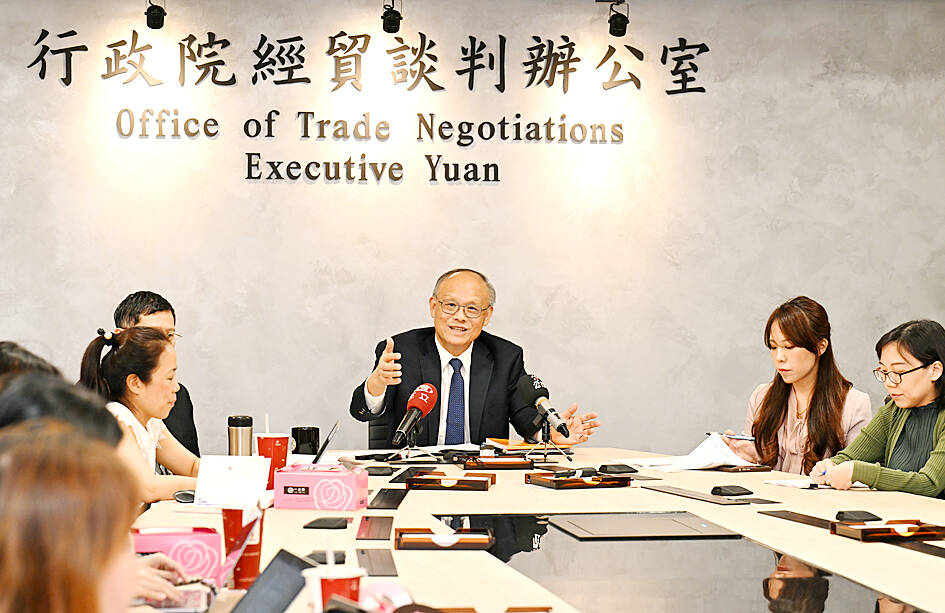Taiwan and Canada have completed negotiations on a pact aimed at promoting investment and protection, about nine months after talks began in February, the two countries announced simultaneously yesterday evening.
The deal, if ratified, “will be beneficial for Taiwanese small and medium-sized enterprises who want to expand their investment presence” in Canada and “support Taiwan’s goal of achieving net-zero transformation,” the Office of Trade Negotiations (OTN) said in a press release.
A statement issued by Global Affairs Canada (GAC), Department of Foreign Affairs, Trade and Development of the Canadian Government, said that the arrangement, once in effect, would help strengthen trade and investment between Canada and Taiwan.

Photo: Tien Yu-hua, Taipei Times
“Today’s announcement showcases Taiwan as an important trade and investment partner, especially as Canada deepens its economic partnerships and relationships in the Indo-Pacific region as part of its Indo-Pacific Strategy,” the GAC said.
A foreign investment promotion and protection arrangement (FIPA), which comprises over 70 articles and appendices, will be formally signed after the completion of the legal text review and respective administrative procedures, according to the two parties.
In line with recent international investment agreements, the FIPA incorporates comprehensive investment protection norms and restricts the host country from imposing additional investment restrictions beyond what has been mutually agreed upon, to ensure investors enjoy a predictable and stable investment environment, the OTN said.
Meanwhile, the host country retains the right to regulate in accordance with its domestic policy objectives while recognizing values such as corporate social responsibility, cultural diversity, environmental protection, gender equality, labor rights and inclusive growth, it said.
Taiwan and Canada formally launched talks on an investment agreement in February, following a year of exploratory discussions on the key concepts of the pact.
With thorough preparation, the negotiation process proceeded smoothly, and a fruitful outcome achieved in less than a year, the OTN said, adding that the office also conducted forums and video conferences with industry stakeholders and relevant parties throughout the process.
The “high-standard investment agreement” clearly demonstrates that both parties adhere to high-standard international economic and trade rules, the OTN said.

Nvidia Corp CEO Jensen Huang (黃仁勳) is expected to miss the inauguration of US president-elect Donald Trump on Monday, bucking a trend among high-profile US technology leaders. Huang is visiting East Asia this week, as he typically does around the time of the Lunar New Year, a person familiar with the situation said. He has never previously attended a US presidential inauguration, said the person, who asked not to be identified, because the plans have not been announced. That makes Nvidia an exception among the most valuable technology companies, most of which are sending cofounders or CEOs to the event. That includes

TARIFF TRADE-OFF: Machinery exports to China dropped after Beijing ended its tariff reductions in June, while potential new tariffs fueled ‘front-loaded’ orders to the US The nation’s machinery exports to the US amounted to US$7.19 billion last year, surpassing the US$6.86 billion to China to become the largest export destination for the local machinery industry, the Taiwan Association of Machinery Industry (TAMI, 台灣機械公會) said in a report on Jan. 10. It came as some manufacturers brought forward or “front-loaded” US-bound shipments as required by customers ahead of potential tariffs imposed by the new US administration, the association said. During his campaign, US president-elect Donald Trump threatened tariffs of as high as 60 percent on Chinese goods and 10 percent to 20 percent on imports from other countries.

Taiwanese manufacturers have a chance to play a key role in the humanoid robot supply chain, Tongtai Machine and Tool Co (東台精機) chairman Yen Jui-hsiung (嚴瑞雄) said yesterday. That is because Taiwanese companies are capable of making key parts needed for humanoid robots to move, such as harmonic drives and planetary gearboxes, Yen said. This ability to produce these key elements could help Taiwanese manufacturers “become part of the US supply chain,” he added. Yen made the remarks a day after Nvidia Corp cofounder and chief executive officer Jensen Huang (黃仁勳) said his company and Taiwan Semiconductor Manufacturing Co (TSMC, 台積電) are jointly

MARKET SHIFTS: Exports to the US soared more than 120 percent to almost one quarter, while ASEAN has steadily increased to 18.5 percent on rising tech sales The proportion of Taiwan’s exports directed to China, including Hong Kong, declined by more than 12 percentage points last year compared with its peak in 2020, the Ministry of Finance said on Thursday last week. The decrease reflects the ongoing restructuring of global supply chains, driven by escalating trade tensions between Beijing and Washington. Data compiled by the ministry showed China and Hong Kong accounted for 31.7 percent of Taiwan’s total outbound sales last year, a drop of 12.2 percentage points from a high of 43.9 percent in 2020. In addition to increasing trade conflicts between China and the US, the ministry said